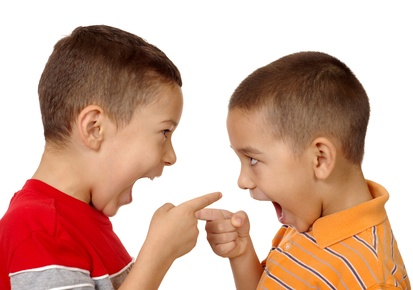Count It All Joy When Siblings Fight…
Sometimes it drives me crazy to hear my kids fighting (btw—my family says that crazy is only a putt away for me, not a drive). At any rate, I hear one  daughter yelling at the other and the other daughter forcefully (albeit quietly) stating her case. It is enough to promote loss of hair. But, sibling rivalry really can produce several positive outcomes. That’s right; sibling disagreements, arguments, and competitions are actually good! Of course I am not talking about out and out, drag down, sock ’em in the nose, hair pulling battles. We don’t want anyone getting hurt here. However, disagreements, arguments, and even some verbal sparring can produce positive results for our children. Here are just a few:
daughter yelling at the other and the other daughter forcefully (albeit quietly) stating her case. It is enough to promote loss of hair. But, sibling rivalry really can produce several positive outcomes. That’s right; sibling disagreements, arguments, and competitions are actually good! Of course I am not talking about out and out, drag down, sock ’em in the nose, hair pulling battles. We don’t want anyone getting hurt here. However, disagreements, arguments, and even some verbal sparring can produce positive results for our children. Here are just a few:
 daughter yelling at the other and the other daughter forcefully (albeit quietly) stating her case. It is enough to promote loss of hair. But, sibling rivalry really can produce several positive outcomes. That’s right; sibling disagreements, arguments, and competitions are actually good! Of course I am not talking about out and out, drag down, sock ’em in the nose, hair pulling battles. We don’t want anyone getting hurt here. However, disagreements, arguments, and even some verbal sparring can produce positive results for our children. Here are just a few:
daughter yelling at the other and the other daughter forcefully (albeit quietly) stating her case. It is enough to promote loss of hair. But, sibling rivalry really can produce several positive outcomes. That’s right; sibling disagreements, arguments, and competitions are actually good! Of course I am not talking about out and out, drag down, sock ’em in the nose, hair pulling battles. We don’t want anyone getting hurt here. However, disagreements, arguments, and even some verbal sparring can produce positive results for our children. Here are just a few: · Sibling rivalry provides the opportunity for our children to practice negotiation skills. They learn to make their point in a convincing and effective manner. They learn that one’s tone of voice can lead to more or less cooperation and certain words or phrases can increase or decrease cooperation. Siblings in the midst of an argument can learn that listening strengthens one’s stance for negotiation. Sibling rivalry helps each person learn how to disagree and promote a point in a way that can achieve the best result.
· Sibling rivalry provides the opportunity to learn about compromise. Through sibling conflict, siblings learn the art of compromise as well has how to show the honor and grace inherent in compromise.
· Sibling rivalry builds competence in problem-solving, both as an individual and as part of a group. Whether a person learns how to compromise, how to negotiate, or how to make a strong point, problem-solving skills grow stronger. All parties learn to work out their differences and reach some level of resolution, even if that means agreeing to disagree and learning how to do that.
· Sibling rivalry helps define individual identities. Each child has to find their place in the family–their role, their purpose, their identity. Sibling rivalry helps each child do that.
· Ironically, sibling rivalry actually helps to build family cohesiveness. As siblings argue and compete, they learn about one another. They learn to
 appreciate one another’s strengths and abilities. As siblings learn to negotiate and compromise, they come to respect one another and look out for one another’s interests. When siblings learn to share honor and grace even amidst the rivalry, they learn to love one another more deeply. All of this helps to build family cohesiveness and intimacy.
appreciate one another’s strengths and abilities. As siblings learn to negotiate and compromise, they come to respect one another and look out for one another’s interests. When siblings learn to share honor and grace even amidst the rivalry, they learn to love one another more deeply. All of this helps to build family cohesiveness and intimacy. Count it all joy when siblings disagree, argue, compete and engage in all sorts of rivalry…well, maybe I’m stretching too far there; but, here are three ways parents can influence sibling rivalry for the best.
· Model healthy rivalry in your own relationships. When you have a disagreement with your spouse, model honor and grace. When you argue with your spouse or a friend, let your children observe how carefully you listen before speaking. Model speech and action during conflict with your children that reveal humility on your part as you work toward resolution.
· Coach your children in the art of disagreement and rivalry. Offer suggestions on how to phrase things in a more honorable manner. Give hints on how speech can influence resolution. Teach your children how listening can increase our understanding of the other person and the problem, leading to a better compromise.
· Acknowledge each of your children’s strengths and abilities. Do not compare children with one another. Instead, encourage their different interests and abilities. Let each of your children know that they hold a special value in your eyes, a value based on their specific person. This can help limit their need to compete for your attention or for their place in the family. Instead, each will know they hold a special place already.
So, are you ready to ruummmmble? No, just joking. No rumbling please. But, a little bit of sibling rivalry can go a long way in producing mature children, especially when parents model and coach positive conflict skills while acknowledging each child’s individual strengths.